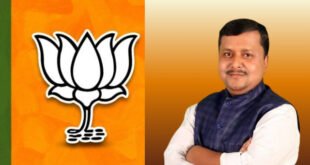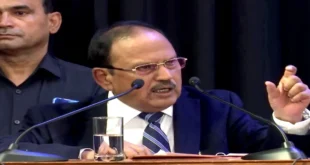The idea is to discuss the challenges women face in running the families parallelly with their jobs, and help cope with them
Venkatramaiah Shantha Kumari, the current chief of the `Sevika Samiti’ told The Hindu that the organisation— founded by Lakshmibai Kelkar in 1936— had taken up the challenge of marking its presence among female professionals like doctors, teachers, engineers, chartered accountants, and those working in MNCs. Apart from the traditional RSS “socialisation” of physical training and games, the `Sevika Samiti Shakhas’ also hold `prabuddha’ (intellectual) meetings to discuss the challenges women face in running the families parallelly with their jobs.
 This was a catchment area of influence that had turned politically significant in the last few years, with voting trends in successive elections showing that women’s support had been important in the mandates received by political parties like the Biju Janata Dal (BJD), the Janata Dal (U) and the BJP.
This was a catchment area of influence that had turned politically significant in the last few years, with voting trends in successive elections showing that women’s support had been important in the mandates received by political parties like the Biju Janata Dal (BJD), the Janata Dal (U) and the BJP.
A group of women between the age group of 10 to 60 gathered at a park in West Delhi on a sunny Sunday morning, to organise a ‘shakha’. After conducting games and yoga, a discussion on issues affecting women, especially with regard to motherhood, work-life balance, live-in relationships and integrating families, was held at the fag end of the one-hour session.
Venkatramaiah Shantha Kumari, the current chief of the `Sevika Samiti’ told The Hindu that the organisation— founded by Lakshmibai Kelkar in 1936— had taken up the challenge of marking its presence among female professionals like doctors, teachers, engineers, chartered accountants, and those working in MNCs. Apart from the traditional RSS “socialisation” of physical training and games, the `Sevika Samiti Shakhas’ also hold `prabuddha’ (intellectual) meetings to discuss the challenges women face in running the families parallelly with their jobs.
 This was a catchment area of influence that had turned politically significant in the last few years, with voting trends in successive elections showing that women’s support had been important in the mandates received by political parties like the Biju Janata Dal (BJD), the Janata Dal (U) and the BJP.
This was a catchment area of influence that had turned politically significant in the last few years, with voting trends in successive elections showing that women’s support had been important in the mandates received by political parties like the Biju Janata Dal (BJD), the Janata Dal (U) and the BJP.
A group of women between the age group of 10 to 60 gathered at a park in West Delhi on a sunny Sunday morning, to organise a ‘shakha’. After conducting games and yoga, a discussion on issues affecting women, especially with regard to motherhood, work-life balance, live-in relationships and integrating families, was held at the fag end of the one-hour session.
 “Our motto is nation-building. That will never happen with force. We just discuss the topics women themselves decide to talk about. Then we leave it to them to decide for their own,” said a `Pracharika’ who did not wish to be named. “We give them scientific reasons as to why it is important to have a child. Rest, they need to decide. Some agree with us, some don’t. Both are welcome,” she added.
“Our motto is nation-building. That will never happen with force. We just discuss the topics women themselves decide to talk about. Then we leave it to them to decide for their own,” said a `Pracharika’ who did not wish to be named. “We give them scientific reasons as to why it is important to have a child. Rest, they need to decide. Some agree with us, some don’t. Both are welcome,” she added.
The outreach is growing, with 3,500 women attending regular “shakhas” in Delhi alone. Thousands of women, mostly those working, attend special sessions, seminars, workshops and other events. The model seems to be based on the IT `Shakhas’ run by the RSS in the early 2000s for young people working in the technology sector, where the sessions were held late in the evening, to suit office hours. The effort is to spread the RSS’ message of “maatritva” or motherhood, and its own version of “feminism” or “Nari Shakti”— phrases that are frequent in the political rhetoric of the BJP.
The `Samiti’ holds over 2,700 ‘Shakhas’ across the country and has collectively around 6,000 `Pracharikas’, `sevikas’ and `Vistarikas’. Ms. Shantakumari said that the ‘Pracharikas’ (volunteers) at the `Sevika Samiti’ helped the women like sisters and mothers and made them understand the importance of ‘parivar’ (family) and ‘Martrituva’ (motherhood). “Our volunteers help women in their office work and even baby-sit their children. We know that the women in metros can’t quit jobs as both male and female members have to earn in order to run the family. With compassion and empathy, we make them understand that it is important to value our culture and remain connected with the roots,” she said.
In Delhi, on a Sunday, the `Sevika Samiti’, organised a run for unity, ‘Manikarnika’, to attract young girls where they were asked to emulate Rani Lakshmi Bai. The run that saw enthusiastic participation from the students of the Jawaharlal Nehru University, was widely advertised by the RSS and the women wing.
Mr. J. Nandakumar, national convenor of Prajna Pravah, an RSS- affiliated organisation, tweeted a video saying, “JNU is changing….Sevika Samiti program ‘Manikarnika’ in connection with birth anniversary month celebration of Rani Laxmibai organised at the Campus.”
“Congratulations to new age Rani Jhansis of JNU,” it added.
It stated that a clear line was being drawn between the Left’s version of feminism and that of the RSS.
(Courtesy ‘The Hindu’)
 Pressmediaofindia
Pressmediaofindia




 Transforming lives of the modern urban women, professionals and those staying at home thereby co-opting them into the RSS fold, has become the mission of the volunteers of the `Rashtriya Sevika Samiti’— a parallel wing of the Rashtriya Swayamsevak Sangh (RSS), run by and for women.
Transforming lives of the modern urban women, professionals and those staying at home thereby co-opting them into the RSS fold, has become the mission of the volunteers of the `Rashtriya Sevika Samiti’— a parallel wing of the Rashtriya Swayamsevak Sangh (RSS), run by and for women.
